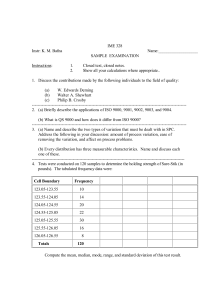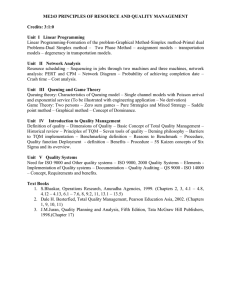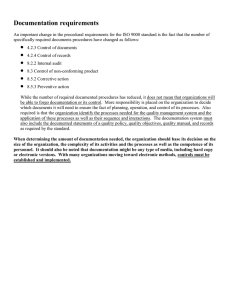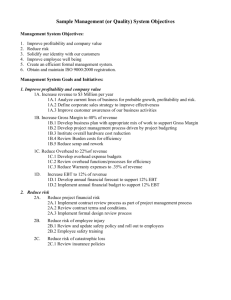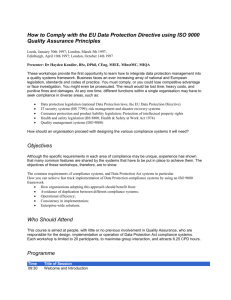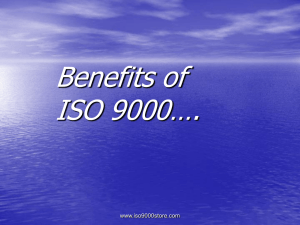ISO 90002
advertisement
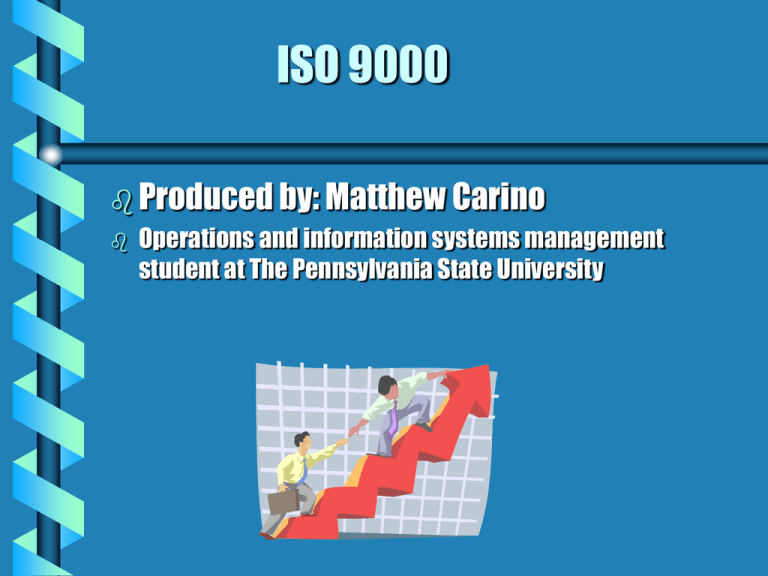
ISO 9000 Produced by: Matthew Carino Operations and information systems management student at The Pennsylvania State University ISO 9000 European standards influencing a worldwide quality focus. ISO 9000 Background and Introduction Background The ISO 9000 Standard was designed by delegates from the United States and members from 14 European countries. Purpose of Standard = To increase conformance and productivity by reducing nonconformance at all stages. Background and Introduction Cont. The standard covers all aspects of business and production. From small businesses to large corporations. Covering tangible and intangible products and services. Why get certified? Over 90 countries have incorporated ISO 9000 into their common day business web. Companies and organizations expect and acknowledge that suppliers or producers that are ISO 9000 compliant will consistently provide quality products or services. Internal and External Benefits Entities that have obtained their Certification have shown reductions in waste and increase in productivity and reliability, as well as increase in product demand and return buyers. By producing high quality products/services it stimulates international growth and feelings of well being and satisfaction in the consumer markets. Should you be certified? Is it worth it? Can we survive in this ever changing and evolving business world without being certified? What do others say? "Without an increase in our sales volume, ISO 9000 compliance has easily saved our company $200,000 a year by increased efficiencies alone." - Jim Sharpe, President, Extrusion Technology, Inc., Randolph, MA Increasing rate of compliancy and standardization. The rate of entities becoming ISO 9000 compliant has risen dramatically in the last 10 years or so. The number of U.S. based companies that have been certified has risen from around 1,000 in 1993 to well over 20,000 in the late 90’s Other countries have followed this same trend. Making ISO 9000 a big focus in many economies. The Ideology of ISO 9000 ISO 9000 is mainly concerned with quality management It focuses on quality services and products. The standards of compliancy are set forth by researchers who determine quality based on market research. Beginning the process Once an entity has decided that becoming ISO 9000 compliant will benefit themselves they must go through a standard process. Pre-requisites of Becoming ISO 9000 Compliant ISO 9000 distinguishes from Quality system requirements, and product/service quality requirements. It also recognizes 4 types of products: Hardware Software Materials Services What does quality rely on? What Questions should be asked? *Are we able to constantly and routinely update products/services to meet the changing environment? *Is the product/service a desirable one for the marketplace? *Is the product/service you produce reliable and constant? *Will you be able to provide customer service throughout the duration of the product’s/service’s life cycle? All work is a Process! This process consists of Inputs and outputs, and the transformation processes involved in making a final product that appeals to customers. An organization as a network! Within each organization, players must link and manage processes efficiently with a relay of accurate pertinent information from source to source. Quality definition and management Quality is based on how well all the processes are defined and managed. What is the weak link if any? Are the processes of high quality? And can they be implemented in a system that utilizes the strength of each process? Pre-requisites of Becoming ISO 9000 Compliant What should be asked to determine if your process is of high quality? Pre-requisites of Becoming ISO 9000 Compliant Have procedures been developed for the control of the processes at hand? Are these procedures well documented and well defined? Are these procedures being put to full use? Can these processes lead to the final output you wish to deliver to the supplier? Action Planning Checklists Once an entity decides to seek registration, they may use action planning checklists. – Action Planning Checklists= Guidelines and areas that ISO 9000 inspectors focus on during their inspection. Evaluation of quality systems Who evaluate these processes and systems? Executive managers: – Within one’s own business/corporation. – If an internal source can pick out faults or weaknesses, they will most likely be seen by outsiders. Evaluation of quality systems The second body of review are Quality auditors. Quality Auditors Internal: First party: Your employees External: Second Party: Your customers Third Party: Independent bodies Documentations of quality systems Quality aspect processes should be well reviewed and documented in writing. – This allows for easy reflect and review of past procedures in looking to advance new ones. – Also an easy way to document failure and causes, which are used for reference. Audits An audit is an inspection of the documents and records that make up your quality system. An audit may be done in advance of the actual ISO 9000 audit. – These are usually done by consultants, and together with management, they try to iron out all non conforming aspects. Final Step The registration audit is the final step in gaining ISO 9000 compliancy. – After the inspection, the number and severity of unconformities are reviewed and scrutinized, If the overall scope of business operations and goal of focus is not skewed then a certificate of compliancy will most likely be granted. ISO FAMILY ISO 9000-1 ISO 9000-2 ISO 9000-3 ISO 9000-4 General guidance tool to determine which publications to focus on. Helps organizations implement ISO 9001,9002,or 9003 Deals with Software businesses and the use of ISO 9001 to help set up new quality systems. Focuses of Dependability* *Dependability includes, but not limited to reliability, maintainability, and availability. Expansions: ISO 9000 is only a guide to the beginning of quality assurance. Many companies and organizations that are ISO 9000 compliant try to stay up to date on new ISO standards. – That may mean implicating different ISO sectors in order to prevail in a fast growing and competitive market. – These sectors are explained in detail at:http://www.isoeasy.org/selusee.pdf Challenges In the fast changing business world it is not only important to satisfy customers, but to improve all aspects of a changing business environment to improve and exceed expectations. Summary Becoming ISO 9000 compliant does not guarantee success, but allows for a good basis for future accomplishments. Once one becomes certified, it is their responsibility to remain a high quality producer/ service provider. Exercise Form into groups and discuss what you think is the ideal company that would benefit from becoming ISO 9000 compliant. Also list factors why companies would not try for their certificate. Bibliography “ISO easy” internet. http://www.iso easy.org “Testimonials from ISO 9000 network clients” internet. http://www.isonet.com/clientco.htm “Frequently asked questions about ISO 9000” internet. http://www.isoeasy.org/faq10.htm “Quality and Environmental Management Systems Consultants in Continuous Improvement” . Internet. http://www.isonet.com/informat.htm
